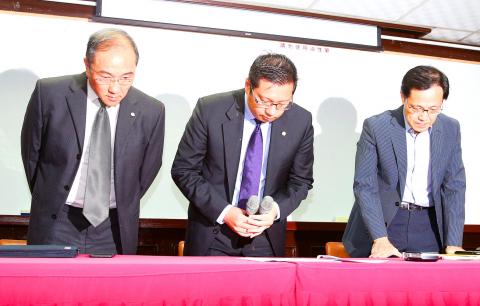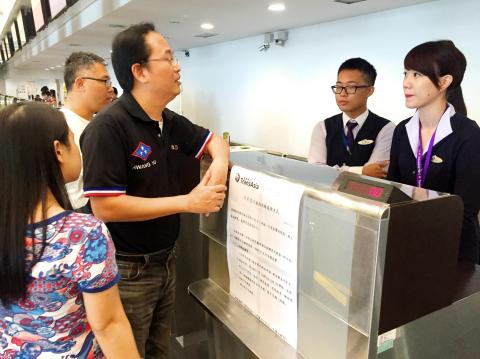TransAsia Airways Corp (復興航空) yesterday said it is to dissolve the company after its attempts to keep it afloat failed.
The company looked at options, including a sale, restructuring and capital injections, during three meetings between its board of directors and industry experts, TransAsia Airways chief executive officer Liu Tung-ming (劉東明) told a news conference at the Taiwan Stock Exchange.
“Despite our best efforts to devise a new business model, the company could not produce an effective turnaround plan to repair its deteriorating finances,” Liu said.

Photo: CNA
The airline said it is unable to repay US$75 million in European convertible bonds due on Tuesday next week.
The company’s net worth was estimated at about NT$5.44 billion (US$170.29 million), or a book value of NT$7.17 per share, as of the end of last month, TransAsia vice president Chen I-chieh (陳逸潔) said.
The airline operated 27 routes in Taiwan, China and the rest of Asia, each representing about a third of total sales, Chen said.

Photo: Lee Chung-hsien, Taipei Times
In the first three quarters, the company racked up losses of NT$2.2 billion, Liu said.
TransAsia chairman Vincent Lin (林明昇) blamed the declining number of Chinese visitors, as well as rising fuel prices and a strengthening US dollar, for the company’s steep losses.
TransAsia’s load factor had fallen to about 60 percent, which was well below its domestic peers’ and unsustainable, Lin said.
TransAsia shares are to resume trading today following yesterday’s suspension, but trading would be conducted on a full-cash delivery basis, the Financial Supervisory Commission (FSC) said.
At a news conference held jointly with the heads of government agencies yesterday, the Cabinet said that the impact of the airline’s closure would be limited and the company has enough cash to refund customers and cover severance pay.
An estimated 100,000 travelers are affected by the unexpected folding of the nation’s first commercial airline, but other carriers have capacity to take on passengers booked to fly with TransAsia as it is the off-season, Civil Aeronautics Administration (CAA) Air Transport Division director Han Chen-hua (韓振華) said.
TransAsia has created a trust fund to ensure that customers get a full refund on booked flights, and the company will not dismiss ticketing and customer service staff until Dec. 20, so that they can assist in the transfer of passengers to other airlines, the firm said.
The CAA formed a special task force immediately after TransAsia announced a temporary suspension of operations on Monday to ensure that travelers’ rights are protected, Fan said.
The CAA is to impose a fine of between NT$600,000 and NT$3 million on TransAsia for halting flights without seeking prior approval.
The CAA has conducted regular financial inspections on TransAsia, and the company still holds more than NT$1 billion in cash and is not facing an immediate financial crisis, Han said.
TransAsia has 1,735 employees and they are covered by labor insurance, while there is NT$310 million in the company’s pension fund account, Deputy Minister of Labor Kuo Kuo-wen (郭國文) said.
“The money is more than enough to pay employees’ pensions and the remaining amount can be used to cover severance pay,” Kuo said.
The FSC and prosecutors have launched an inspection into possible insider trading in the company’s shares, and it has yet to be determined whether company executives were involved, commission vice chairman Huang Tien-mu (黃天牧) said.
The Taiwan Stock Exchange on Aug. 15 listed TransAsia as financially unstable, to warn investors of the risk involved in trading the company’s shares, Huang said.

Tropical Storm Gaemi strengthened into a typhoon at 2pm yesterday, and could make landfall in Yilan County tomorrow, the Central Weather Administration (CWA) said yesterday. The agency was scheduled to issue a sea warning at 11:30pm yesterday, and could issue a land warning later today. Gaemi was moving north-northwest at 4kph, carrying maximum sustained winds near its center of up to 118.8kph and gusts of 154.8kph. The circumference is forecast to reach eastern Taiwan tomorrow morning, with the center making landfall in Yilan County later that night before departing from the north coast, CWA weather forecaster Kuan Shin-ping (官欣平) said yesterday. Uncertainty remains and

SEA WARNING LIKELY: The storm, named Gaemi, could become a moderate typhoon on Wednesday or Thursday, with the Taipei City Government preparing for flooding A tropical depression east of the Philippines developed into a tropical storm named Gaemi at 2pm yesterday, and was moving toward eastern Taiwan, the Central Weather Administration (CWA) said. Gaemi could begin to affect Taiwan proper on Tuesday, lasting until Friday, and could develop into a moderate typhoon on Wednesday or Thursday, it said. A sea warning for Gaemi could be issued as early as Tuesday morning, it added. Gaemi, the third tropical storm in the Pacific Ocean this typhoon season, is projected to begin moving northwest today, and be closest to Taiwan on Wednesday or Thursday, the agency said. Today, there would likely

DISRUPTIONS: The high-speed rail is to operate as normal, while several airlines either canceled flights or announced early departures or late arrivals Schools and offices in 15 cities and counties are to be closed today due to Typhoon Gaemi, local governments announced last night. The 15 are: Taipei, New Taipei City, Taoyuan, Tainan, Keelung, Hsinchu and Kaohsiung, as well as Yilan, Hualien, Hsinchu, Miaoli, Chiayi, Pingtung, Penghu and Lienchiang counties. People should brace for torrential rainfall brought by the storm, with its center forecast to make landfall on the east coast between tonight and tomorrow morning, the Central Weather Administration (CWA) said. The agency issued a sea warning for the typhoon at 11:30pm on Monday, followed by a land warning at 11:30am yesterday. As of

CASUALTY: A 70-year-old woman was killed by a falling tree in Kaohsiung as the premier warned all government agencies to remain on high alert for the next 24 hours Schools and offices nationwide are to be closed for a second day today as Typhoon Gaemi crosses over the nation, bringing torrential rain and whipping winds. Gaemi was forecast to make landfall late last night. From Tuesday night, its outer band brought substantial rainfall and strong winds to the nation. As of 6:15pm last night, the typhoon’s center was 20km southeast of Hualien County, Central Weather Administration (CWA) data showed. It was moving at 19kph and had a radius of 250km. As of 3pm yesterday, one woman had died, while 58 people were injured, the Central Emergency Operation Center said. The 70-year-old